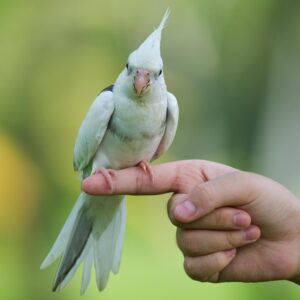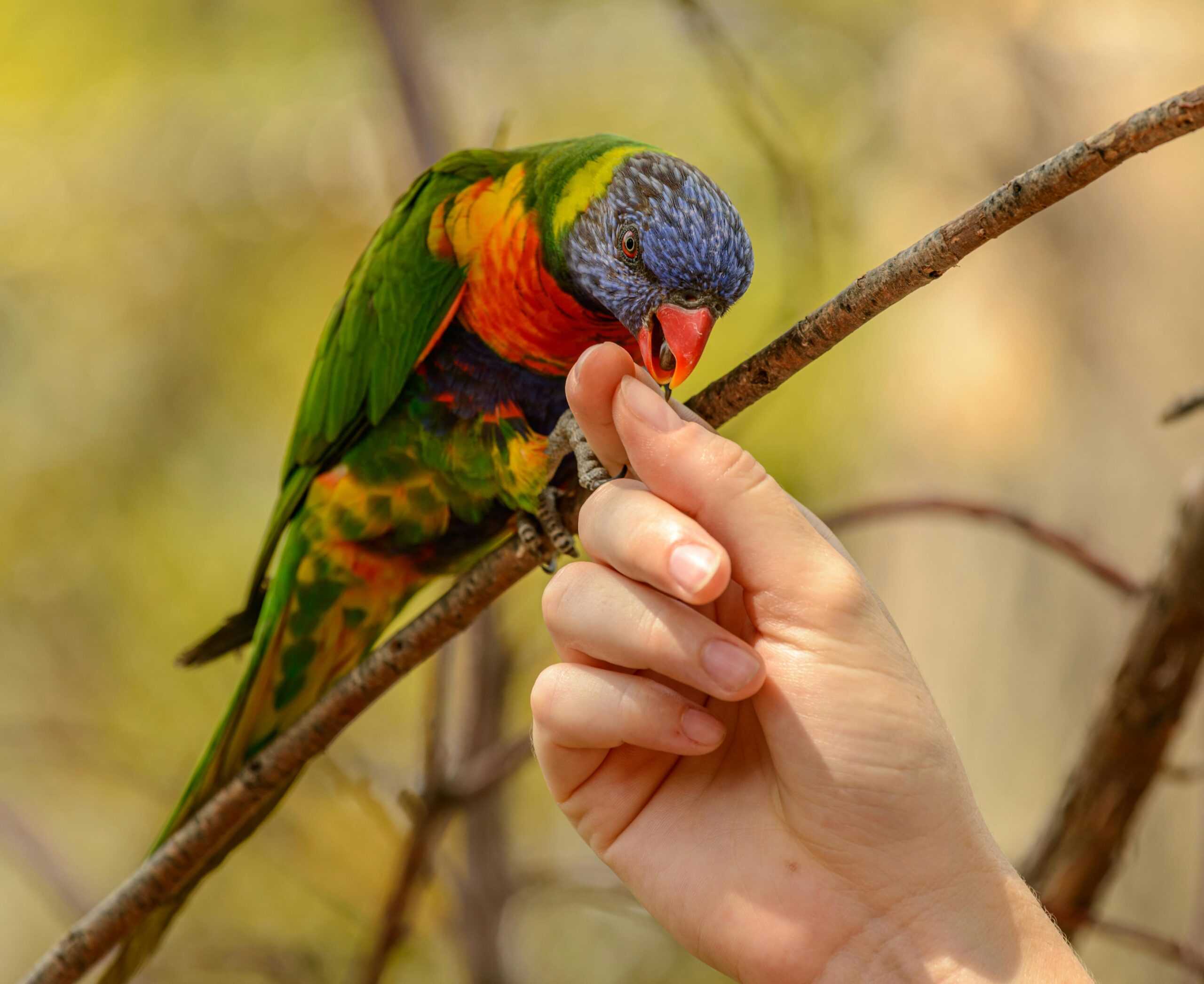Biting and beaking by birds have been thought to be the same thing by humans but they are completely different communication and defense responses used by birds.
Beaking in birds is a social behavior of exploring objects or humans. It can be likened to babies using their hands to touch, feel, and explore everything that comes their way.
While biting of humans by birds is a defensive mechanism when they feel threatened or startled and it is usually accompanied by aggressive or confrontational body language.
It is important to know the difference between biting and beaking behaviors by birds to respond accurately.
How Does Beaking Feel:
The sensational feeling of a bird’s beak depends on the bird species, size, strength, and why you were beaked by a bird.
In general, beaking is either gentle, ticklish, mild, or warm.
Beaking by a bird can be a gentle touch when felt on arms and hands. It can be tingly when felt on sensitive skin and body parts such as the ears, fingers, or under the feet.
In some cases, it can be more assertive on the skin when the bird is startled.
How Does Biting Feel:
Biting just like the beaking sensation depends on the bird species, size, strength, and reasons for biting.
Here are some biting sensations felt by birds:
- Sharpness: Bird’s beaks are usually sharp, pointed, and strong. When pierced by a bird’s beak the aftermath sensation can be a sharp feeling especially when done by aged birds
- Pressure: The pressure feeling of a bird’s bite varies based on the bird’s age and size. The bite pressure of young and small-sized birds is lesser than that of adult and aged birds.
Biting sensation also varies based on the location of the bite and human responses.
Bites on body parts such as the eyes, nose, fingers, cheeks, under the feet, ears, etc are more painful compared to bites on tougher and less sensitive parts of the skin.
Meanwhile, our reflexes to a bird’s bite can either increase or subsidize the degree and sensation of the bite.
If you attempt to yell, strike, or pull away quickly the bite can be more intense and firm.
Why Will A Bird Beak You:
Beaking is a gentle sensation and non-threatening behavior as opposed to a bite and it is done by birds for several reasons.
Birds are very cautious and curious animals, they use their beaks to study their environment.
When your hands or fingers are stretched, a bird will likely beak on it to test its firmness and rigidity before perching.

A bird will also likely beak you when wearing or holding an unfamiliar cloth or object. They usually do this out of curiosity to examine unfamiliar objects in their surroundings.
Beaking is also a means of communication and attention-seeking by birds not just with humans but also with other birds.
A bird’s beaking is a way of socializing either by being playful, friendly, or affectionate.
They also bond better when they beak on you which is a sign of trust and affection.
Why Will A Bird Bite Me:
Biting is an act of self-defense exhibited when they feel threatened, started, or fearful.
A bird will likely bite the owner when it feels the owner is intruding in their territorial space (Cage) when it wants to be left alone which can be induced by hormones.
They will also likely bite you if they are experiencing pains or discomfort and you touch them. In such cases, it is advised to seek the help of a veterinarian.
How To Correct A Bird From Biting:
To correct any behavior, you have to understand the root cause whether it’s fear, hormones, or health issues. Always seek to identify the triggers.
1. Avoid Punishment:
Do not shout or yell at a bird when bitten. This can make them think they are doing the right thing.
Always speak to them calmly and use body language to express your displeasure. whenever bitten, put them back in their cage to signal they have offended you.
2. Consult A vertinarian:
Seek advice from an avian veterinarian if the triggers are a result of underlying health issues.
Common health issues such as discomfort, pain, infection, dietary complications, and changes in hormones during breeding or adolescence stage can cause frustrations and possible aggressions leading to a bite.
They should be properly treated on time and should be protected from visitors and other pet animals while recovering.
3. Moulting:
This is the shedding of old feathers, skin, or furs for new ones. During this period they are likely to be easily irritated which can lead to a bite.
They are less active and quiet when shedding and it is best advised to be attentive and caring.
Can You Get An Infection From A Bird’s Bite:
Yes, but it is very unlikely to be infected from a bird’s bite but the possibilities are there.
If a bird has bacteria in the mouth and the bite pierces through your skin leaving bruises or injuries and it is not treated, it can lead to infestation.
It is best advised to always clean and treat a wound from a pet’s bite and if you do not feel at ease, you should consult with a doctor.
It is also worthy of note that individuals with prevailing health challenges can get worse from negative interactions with pets and should stay clear from frequent interactions with pets including birds.
Will A Bird Make A Wonderful Pet:
Yes, a bird will make a wonderful pet despite the fact they can bite just like other domesticated pets such as cats, dogs, etc.
Birds are very colorful and attractive animals, they are generally considered low-maintenance animals because they require less space and are easy to clean cause they can self-groom.
They are among the cleanest pet animals, and they are highly recommended for first-time pet owners.
They are intelligent creatures capable of mimicking human sounds and voices which is a joy to watch.
However, not every species of bird is best for household keeping. Examples of birds suitable for household pets are finches, lovebirds, African grey parrots, cockatoos, etc.

